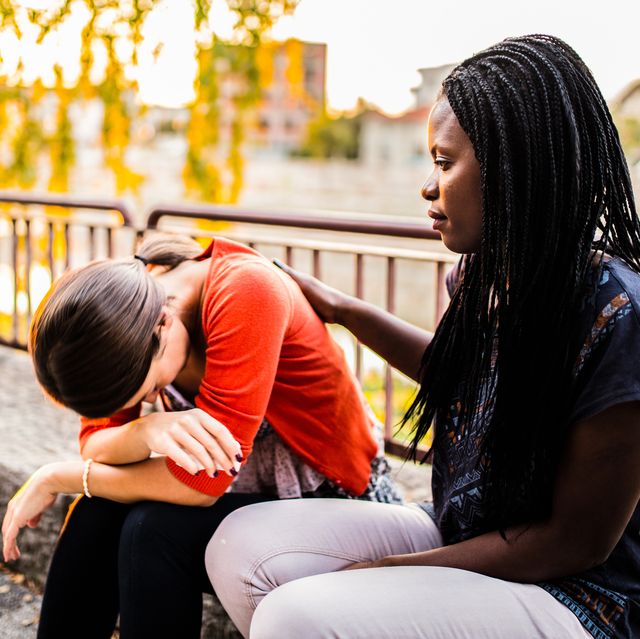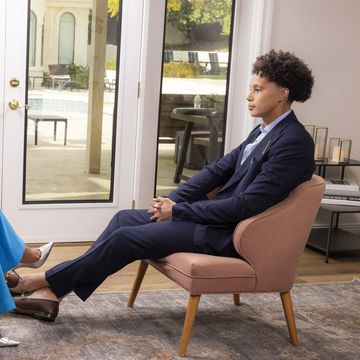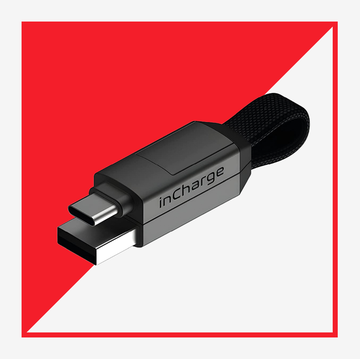Yes, romantic breakups are super painful—but friendship breakups can hurt just as badly. That’s right: No matter how many years you’ve been besties, sometimes even the longest friendships can come to an end (especially if they become toxic). And while you may not have been romantically involved, this doesn’t mean that the termination of your friendship doesn’t hurt like hell.
Friendship breakups can be particularly challenging because a close friend is someone who you rely on for emotional support, continuity, socialization, and processing, says Akua Boateng, PhD, a Philadelphia-based psychologist. Friends can even become family, if not something pretty darn close to it.
"Friendships can play a role in your overall mental and emotional health," Boateng adds. "When they end, it’s a big shift. Many people wonder how they’ll be able to cope without the support of that friendship."
That said, sometimes friendships can become too damaging to continue, and because you’re so connected, it’s difficult to cut ties. (And you might even avoid doing so…) "But, you owe it to your relationship [to break it off], even if you’re not in a good place with the person," says Andrea Bonior, PhD, clinical psychologist and author of The Friendship Fix: The Complete Guide to Choosing and Losing, and Keeping Up With Your Friends. Otherwise, "they’ll be left lost and confused if you don’t say anything," Bonoir says.
TL;DR: If you’re distancing yourself from a friend that you’d normally text or see every day, you kiiinda owe them an explanation for your (lack of) action. Easier said than done, but not impossible. Here's everything you need to know about breaking up with friends, one-sided friendships, keeping things civil for the rest of your friend group, and more—according to relationship experts.
First off, there are solid reasons to break up a friendship.
Friendships can be complicated, and there’s likely not a single cause for your platonic relationship coming to an end. Oftentimes, however, failed communication can play a big role. How? Each person conveys what their needs, boundaries, and expectations are from the relationship differently.
"Whenever there’s a challenge on either side communicating those things, it creates a schism that makes the relationship not viable or helpful moving forward," Boateng says. A stall in communication can also lead to people growing apart over time, as it becomes increasingly difficult to keep in touch, especially as their daily lives don’t mesh anymore, Bonoir adds.
You might even feel like the friendship’s off balance, with one of you giving more to the friendship than the other. This is called a one-sided friendship. In this kind of relationship, the situation oftentimes comes down to one person’s needs not being met, Boateng explains.
For example, a friend may have trouble communicating their needs, and if "they cannot say what they need, [you] cannot meet those needs," Boateng notes. Sometimes, however, you are able to communicate your needs just fine—it’s your friend who chooses not to meet them, Boateng says.
Perhaps you invite your pal to hangout, and they always want you to come to them, rather than switching on and off. Or, they never notice when you’re upset or need to talk. Maybe they never ask about your life, but expect you to hear about theirs all the time. All in all, one-sided friendships are a one-way ticket to dissatisfaction.
Here are some other signs that you and a friend should call it quits:
Another major reason for a friendship breakup? Betrayal, Boateng says. "A boundary has been crossed in the relationship and, due to the pain of that betrayal, it becomes very challenging to see how trust can be regained," Boateng explains. This can look like a large, singular incident of crossing a boundary, or perhaps you’ve been noticing their toxicity over time. (I.e. Maybe you don’t feel like your best self around them because they regularly put you down or gossip about you.)
Whatever pushes you to cut things off, if you simply don’t feel good about yourself or your friendship when you’re together, that’s reason enough to go your separate ways.
But sometimes, it's worth trying to repair a friendship.
"I'm a big believer in giving the other person the benefit of the doubt," Boateng explains. If you’re unclear as to whether or not you want to end your friendship, you might want to try talking things through with your bud to ensure you’re on the same page before saying goodbye to them for good. (They might not even know you’re feeling off about your friendship.)
After you and your friend speak about any issues—such as reiterating boundaries, or talking through a disagreement or deceit—and you’ve given them clear expectations about how you want the relationship to move forward, give them a chance to meet those expectations, Boateng says.
Then, "if you have given your friend multiple chances to provide either the level of support you need or to attend to the boundaries you've set, and they have failed to do that for a considerable amount of time, it may be time to think about minimizing that person's access to you," advises Boateng.
In short, don’t expect your friend to be a mind reader: Tell them how you feel and then, after they know, see how they change their actions. (Or how they don’t.) This will ultimately give you the information you need to decide whether or not you want that relationship to continue.
Overall, though, note this: "If someone’s presence in your life does you emotional, physical, or mental harm, or it is hindering your own growth, then it’s time to terminate the friendship," Boateng explains.
Friendship breakups can feel even more complicated than romantic ones.
As important as friendships are, romantic relationships tend to get all the glory while platonic ones are undervalued. Without the weighty expectation of monogamy, people have a hard time ending friendships. Think about it: You have to breakup with a partner in order to move on to someone new, but there’s nothing stopping you from avoiding a friendship breakup indefinitely, putting off the confrontation, and hanging out with some other buds instead.
But you owe it to yourself and your friend a clean break if you’re unhappy, says Bonior. That way, neither of you wastes any time—even the few secs it takes to send a text—on someone who is no longer receptive.
And though "people often underestimate what a big deal it is for a friendship to end," friendship breakups are just as uncomfortable and sad as romantic ones, Bonior points out.
Breakup conversations might escalate into arguments; your friend might get defensive or try and convince you to stick around. But, if you don’t feel like you’re a good match anymore, you need to let them go—the same way you would a significant other.
How you end a friendship can go any number of ways.
If you’re pulling the plug, whatever you do, make it easier on yourself by not leaving the door open to ambiguity, says Bonior: "Be as clear and as gentle as possible."
She’s not saying you need to get into the nitty-gritty of something your friend said on a Wednesday morning three months ago, but make sure they can walk away from the conversation with a definite understanding of why you broke things off.
Try: "You probably noticed I haven’t had as much time to spend together lately. To be honest, I feel my life is moving in a different direction these days, and I wanted to be honest with you and tell you I won’t be hanging out as much. I’m glad we’ve had a friendship, but I don’t think we're a good fit anymore."
If the two of you hadn’t already and noticeably drifted apart, you might get some pushback. Your friend may promise to change and do better for you. If you think you can work things out and trust they’ll do their part in repairing the friendship, great.
But, if you’re not willing to devote any more time to this friendship and are certain you want to break up, don’t budge. Say: "Look, there isn’t anything more for us to do here. I just wanted to let you know that I’m not looking for things to be different; I’m just telling you I’m in a different place."
Coping with a friendship breakup is tough, but not impossible.
Now, if a friend breaks up with you, one of the best things you can do is take some time for self-reflection. Try and pinpoint patterns in your other friendships or former friendships, Bonior suggests.
"If you notice you’ve had friendships come to an end in a similar way over and over again, it’s important to pay attention to what might be going on. It could be that you’re picking people you’re not compatible with. It could be that you’re all hot and heavy in a friendship for a while, and then you duck out when things get boring," she says."Or, it could be that you are doing something within the relationship that’s causing conflict."
Remember, friendships naturally wax and wane. There’s no hard and fast rule that says people have to have the same friends their whole lives. "And when they end, that doesn’t negate their positive aspects," says Bonior. "Just because a friendship ended doesn’t mean you have to pretend it never existed or wipe it from your life story because you can still find it very valuable."
Leaning into self-care rituals can help with this. Journal, meditate, talk to another pal or a therapist about what you’ve appreciated and will take away from this now-former friendship, Bonior suggests. Yes, you’ll miss them a ton, but you’ll find doing this will make it easier on you to move forward.
There tends to be a lot of shame and embarrassment around grief when it comes to friendship breakups, but they’re significant losses. You might downplay your feelings and think, "well, it’s not like I just got divorced or something," but friendships carry a lot of emotional weight—something you might not realize until it’s over. So, "give yourself permission to feel and don’t beat yourself up if it affects you more than you expected," says Bonior.
A breakup doesn't have to make things uncomfortable for the rest of your friends.
Realistically though, you’ll have to readjust. Because you'll both need time and space to heal, you might have to back out of certain events because it’ll be uncomfortable. Or maybe, some of you might end up breaking out into smaller groups for a bit. But if you and your ex-friend can eventually get to a place where you can keep your cool in group settings and respect each other’s space, make it known to a mutual pal that you don’t mind going to that group brunch as long as they're cool with it, too.
"Just be careful that you’re not putting mutual friends in uncomfortable situations," says Bonior. Don’t make them choose between you two, and don’t pressure them into seeing things from your perspective. "Be cognizant that people have the right to keep up the friendships they want to keep up, and they might be seeing things from a different lens than you are," she adds.
As long as you can maintain respect for each other’s decisions, you shouldn’t have a problem maintaining your other friendships.












